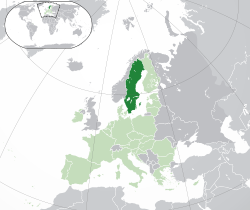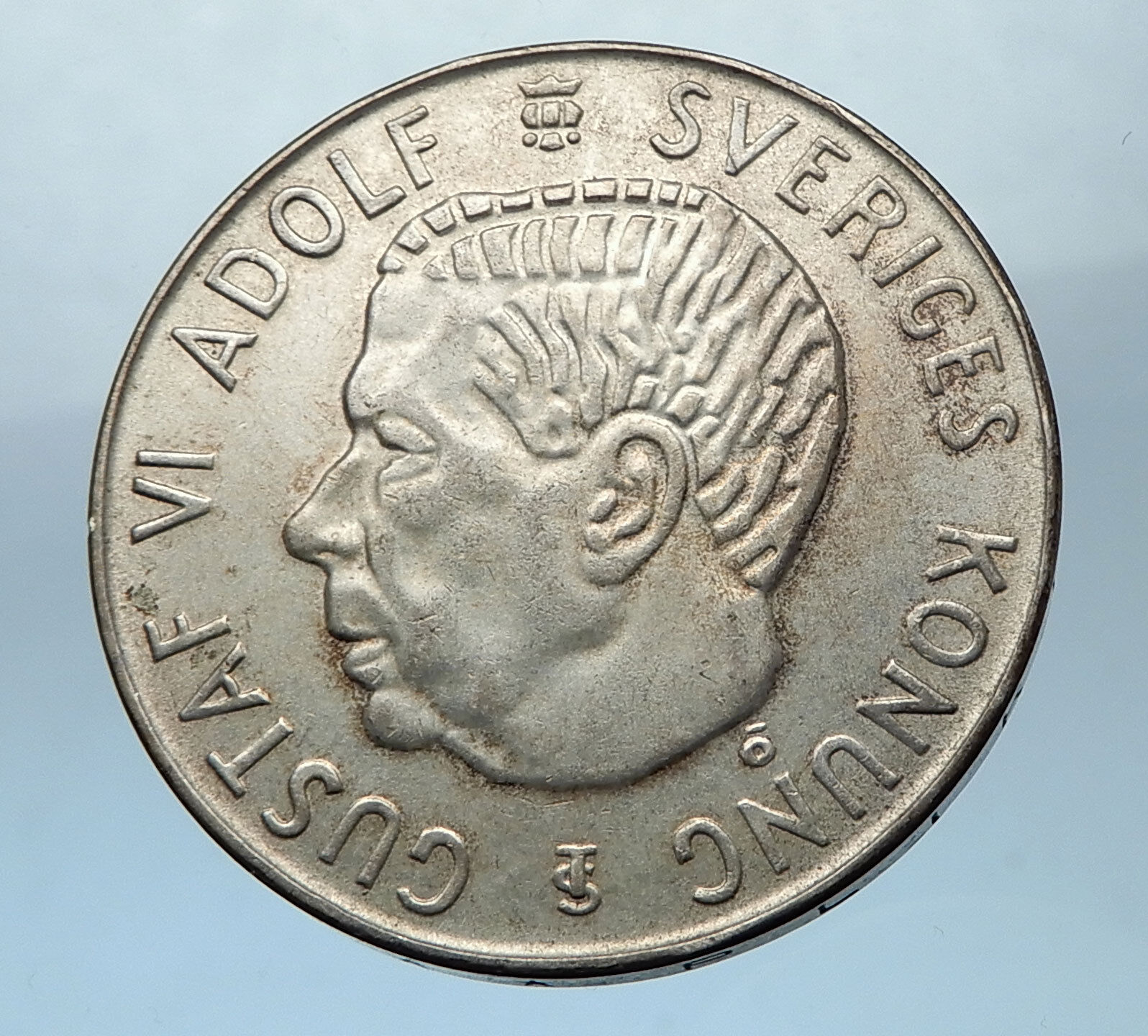|
Sweden – Gustaf V – King: 8 December 1907 – 29 October 1950
Constitutional Reform
1975 Silver 50 Kronor 36mm (27.02 grams) 0.925 Silver (0.oz. ASW)
Reference: KM# 848 | Engraver: Léo Holmgren
SVERIGE E 50KR U, The Three Crowns of Sweden above value.
ALL·OFFENTLIG·MAKT·I·SVERIGE·UTGÅR·FRÅN·FOLKET 1975, Flaming torch, out of which two oak leaf sprigs stand out, divides date; below and at sides dozens of hands stand open to reach the torch.
You are bidding on the exact item pictured, provided with a Certificate of Authenticity and Lifetime Guarantee of Authenticity.
 Carl XVI Gustaf (Carl Gustaf Folke Hubertus; born 30 April 1946) is King of Sweden. He ascended the throne on the death of his grandfather, Gustaf VI Adolf, on 15 September 1973. Carl XVI Gustaf (Carl Gustaf Folke Hubertus; born 30 April 1946) is King of Sweden. He ascended the throne on the death of his grandfather, Gustaf VI Adolf, on 15 September 1973.
He is the youngest child and only son of Prince Gustaf Adolf, Duke of Västerbotten, and Princess Sibylla of Saxe-Coburg and Gotha. His father died on 26 January 1947 in an airplane crash in Denmark when Carl Gustaf was nine months old. Upon his father’s death, he became second in line to the throne, after his grandfather, the then Crown Prince Gustaf Adolf. Following the death of his great-grandfather, King Gustaf V, in 1950, Gustaf Adolf ascended the throne and thus Carl Gustaf became Sweden’s new crown prince and heir apparent to the throne at the age of four.
Shortly after he became king in 1973, the new 1974 Instrument of Government took effect, formally stripping Carl XVI Gustaf of his remaining executive power. As a result, he no longer performs many of the duties normally accorded to a head of state, such as the formal appointment of the prime minister, signing off on legislation, and being commander-in-chief of the nation’s military. The new instrument explicitly limited the king to ceremonial functions and, among other things, to be regularly informed of affairs of state. As head of the House of Bernadotte Carl Gustaf has also been able to make a number of decisions about the titles and positions of its members.
The King’s heir apparent, after passage on 1 January 1980 of a new law establishing absolute primogeniture (the first such law passed in Western European history), is Crown Princess Victoria, the eldest child of the King and his wife, Queen Silvia. Before the passage of that law, Crown Princess Victoria’s younger brother, Prince Carl Philip, was briefly the heir apparent, as of his birth in May 1979. Carl XVI Gustaf is the longest-reigning monarch in Swedish history, having surpassed King Magnus IV’s reign of 44 years and 222 days on 26 April 2018.
 Sweden, officially the Kingdom of Sweden, is a Scandinavian country in Northern Europe. It borders Norway and Finland, and is connected to Denmark by a bridge-tunnel across the Öresund. At 450,295 square kilometres (173,860 sq mi), Sweden is the third-largest country in the European Union by area, with a total population of over 9.8 million. Sweden consequently has a low population density of 21 inhabitants per square kilometre (54/sq mi), with the highest concentration in the southern half of the country. Approximately 85% of the population lives in urban areas. Southern Sweden is predominantly agricultural, while the north is heavily forested. Sweden is part of the geographical area of Fennoscandia. Sweden, officially the Kingdom of Sweden, is a Scandinavian country in Northern Europe. It borders Norway and Finland, and is connected to Denmark by a bridge-tunnel across the Öresund. At 450,295 square kilometres (173,860 sq mi), Sweden is the third-largest country in the European Union by area, with a total population of over 9.8 million. Sweden consequently has a low population density of 21 inhabitants per square kilometre (54/sq mi), with the highest concentration in the southern half of the country. Approximately 85% of the population lives in urban areas. Southern Sweden is predominantly agricultural, while the north is heavily forested. Sweden is part of the geographical area of Fennoscandia.

 Germanic peoples have inhabited Sweden since prehistoric times, emerging into history as the Geats/Götar and Swedes/Svear and constituting the sea peoples known as the Norsemen. Sweden emerged as an independent and unified country during the Middle Ages. In the 17th century, it expanded its territories to form the Swedish Empire, which became one of the great powers of Europe until the early 18th century. Swedish territories outside the Scandinavian Peninsula were gradually lost during the 18th and 19th centuries, beginning with the annexation of present-day Finland by Russia in 1809. The last war in which Sweden was directly involved was in 1814, when Norway was militarily forced into personal union. Germanic peoples have inhabited Sweden since prehistoric times, emerging into history as the Geats/Götar and Swedes/Svear and constituting the sea peoples known as the Norsemen. Sweden emerged as an independent and unified country during the Middle Ages. In the 17th century, it expanded its territories to form the Swedish Empire, which became one of the great powers of Europe until the early 18th century. Swedish territories outside the Scandinavian Peninsula were gradually lost during the 18th and 19th centuries, beginning with the annexation of present-day Finland by Russia in 1809. The last war in which Sweden was directly involved was in 1814, when Norway was militarily forced into personal union.
Since then, Sweden has been at peace, maintaining an official policy of neutrality in foreign affairs. The union with Norway was peacefully dissolved in 1905, leading to Sweden’s current borders. Though it was formally neutral through both world wars, Sweden engaged in humanitarian efforts, such as taking in refugees from German-occupied Europe. After the end of the Cold War, Sweden joined the European Union on 1 January 1995, but declined NATO membership.
Today, Sweden is a constitutional monarchy and a parliamentary democracy, with the Monarch as the head of state. The capital city is Stockholm, which is also the most populous city in the country. Legislative power is vested in the 349-member unicameral Riksdag. Executive power is exercised by the Government, chaired by the Prime Minister. Sweden is a unitary state, currently divided into 21 counties and 290 municipalities.
Sweden maintains a Nordic social welfare system that provides universal health care and tertiary education for its citizens. It has the world’s eighth-highest per capita income and ranks highly in numerous metrics of national performance, including quality of life, health, education, protection of civil liberties, economic competitiveness, equality, prosperity and human development. Sweden has been a member of the European Union since 1 January 1995, but declined Eurozone membership following a referendum. It is also a member of the United Nations, the Nordic Council, Council of Europe, the World Trade Organization and the Organisation for Economic Co-operation and Development (OECD).
|





 Carl XVI Gustaf (Carl Gustaf Folke Hubertus; born 30 April 1946) is King of Sweden. He ascended the throne on the death of his grandfather, Gustaf VI Adolf, on 15 September 1973.
Carl XVI Gustaf (Carl Gustaf Folke Hubertus; born 30 April 1946) is King of Sweden. He ascended the throne on the death of his grandfather, Gustaf VI Adolf, on 15 September 1973. Sweden, officially the Kingdom of Sweden, is a Scandinavian country in Northern Europe. It borders Norway and Finland, and is connected to Denmark by a bridge-tunnel across the Öresund. At 450,295 square kilometres (173,860 sq mi), Sweden is the third-largest country in the European Union by area, with a total population of over 9.8 million. Sweden consequently has a low population density of 21 inhabitants per square kilometre (54/sq mi), with the highest concentration in the southern half of the country. Approximately 85% of the population lives in urban areas. Southern Sweden is predominantly agricultural, while the north is heavily forested. Sweden is part of the geographical area of Fennoscandia.
Sweden, officially the Kingdom of Sweden, is a Scandinavian country in Northern Europe. It borders Norway and Finland, and is connected to Denmark by a bridge-tunnel across the Öresund. At 450,295 square kilometres (173,860 sq mi), Sweden is the third-largest country in the European Union by area, with a total population of over 9.8 million. Sweden consequently has a low population density of 21 inhabitants per square kilometre (54/sq mi), with the highest concentration in the southern half of the country. Approximately 85% of the population lives in urban areas. Southern Sweden is predominantly agricultural, while the north is heavily forested. Sweden is part of the geographical area of Fennoscandia.
 Germanic peoples have inhabited Sweden since prehistoric times, emerging into history as the Geats/Götar and Swedes/Svear and constituting the sea peoples known as the Norsemen. Sweden emerged as an independent and unified country during the Middle Ages. In the 17th century, it expanded its territories to form the Swedish Empire, which became one of the great powers of Europe until the early 18th century. Swedish territories outside the Scandinavian Peninsula were gradually lost during the 18th and 19th centuries, beginning with the annexation of present-day Finland by Russia in 1809. The last war in which Sweden was directly involved was in 1814, when Norway was militarily forced into personal union.
Germanic peoples have inhabited Sweden since prehistoric times, emerging into history as the Geats/Götar and Swedes/Svear and constituting the sea peoples known as the Norsemen. Sweden emerged as an independent and unified country during the Middle Ages. In the 17th century, it expanded its territories to form the Swedish Empire, which became one of the great powers of Europe until the early 18th century. Swedish territories outside the Scandinavian Peninsula were gradually lost during the 18th and 19th centuries, beginning with the annexation of present-day Finland by Russia in 1809. The last war in which Sweden was directly involved was in 1814, when Norway was militarily forced into personal union.




